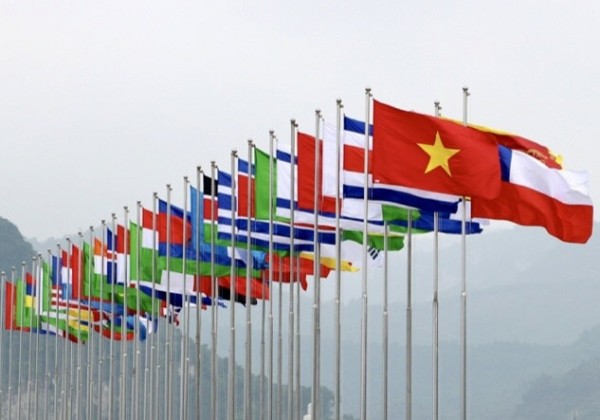(VOVWORLD) - On April 10, 2013, the Party Politburo issued Resolution No. 22 on international integration. Over the past 10 years of international integration, the Resolution has proved to be a guideline for Vietnam’s remarkable and steady development.
 Illustrative photo (photo: dangcongsan.vn) Illustrative photo (photo: dangcongsan.vn) |
The Party’s Resolution 22 affirms Vietnam’s policy of comprehensive integration and marks a new development step and a major strategic orientation of Vietnam. The Resolution emphasizes the need to promote internal resources and at the same time create favorable conditions to mobilize external resources for national construction and defense.
The resolution also highlights the importance of proactive international integration and participation in the development of international rules and codes of conduct. The cross-cutting aim of the integration strategy is to best protect national interests, promote international cooperation, maintain a favorable environment for peace and development, and combine national strength with the strength of the era to raise Vietnam’s status.
Creating conditions for Vietnam’s development
Under Resolution 22, Vietnam’s guiding principle in international integration is to put national interests first, while respecting international law and the UN Charter and pursuing equal cooperation and mutual benefit. The resolution also clarifies advantages and disadvantages of international integration and stresses the need to find ways to control the disadvantages and make the most of favorable conditions for national development and defense. The resolution also points out ways to implement Vietnam's international integration.
During the past 10 years of implementing Resolution 22, national renewal and international integration have created momentum for Vietnam’s development, with higher, more comprehensive growth.
During the last ten years, Vietnam’s GDP doubled, from 212 billion USD in 2013 to more than 400 billion. Vietnam's trade turnover is now more than 730 billion USD and the economy’s openness has increased approximately 200%. Together with national renewal, international integration is making significant contribution to Vietnam’s development. Vietnam has taken advantage of external resources to promote trade, foreign direct investment, and economic relations with other countries.
Vietnam has maintained a favorable environment for peace, cooperation and development, thereby effectively contributing to national construction and defense. Vietnam has improved its international position.
Based on the principles of international law and the UN Charter, Vietnam has contributed to international activities, strengthened relations with other countries, and organizations, particularly neighboring countries, and key partners in ASEAN, APEC, and the UN. Vietnam has established strategic or comprehensive partnerships with 30 countries.
Vietnam has extensively engaged in global value and supply chains, new-generation, high-quality free trade agreements, including the Comprehensive and Progressive Agreement for Trans-Pacific Partnership (CPTPP), the EU-Vietnam Free Trade Agreement (EVFTA), and the Regional Comprehensive Economic Partnership (RCEP).
This has created favorable conditions for Vietnam’s development and security and enhanced Vietnam’s friendship, and long-term, stable and effective cooperation with other countries and international organizations. International integration has helped Vietnam elevate its international status, especially in multilateral institutions which was clearly manifested when Vietnam served as ASEAN Chair in 2020, as a non-permanent member of the UN Security Council for the second time during the 2020-2021 tenure, as Chairman of APEC in 2017, and became a member of the UN Human Rights Council for the 2023-2025 tenure.
New motivation for Vietnam to move forward
During the past 10 years of implementing Resolution 22, Vietnam has played an active role and contributed to the development of international codes of conduct, effectively engaged in international activities related to global peace, development, climate change and the environment.
Vietnam has made strong commitments to emission reductions. Vietnam has been acknowledged by the international community for its performance as ASEAN Chair, non-permanent member of the UN Security Council, member of the UN peacekeeping force, and Chair of APEC. Vietnam’s achievements over the past 10 years, thanks to Resolution 22, have created a new impetus for Vietnam's integration and foreign policy in the coming development period.
Under the Resolution of the 13th National Party Congress, foreign policy will play a pioneer role in mobilizing resources for national development, creating friendly relations with other countries, creating a favorable environment for peace and development, and enhancing Vietnam’s position in the international arena.